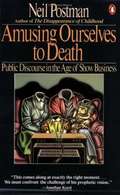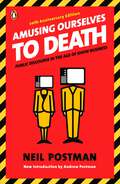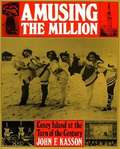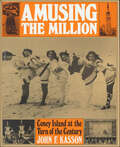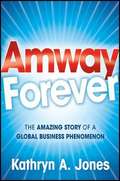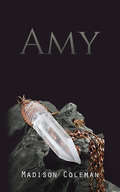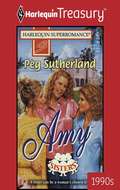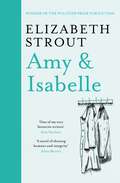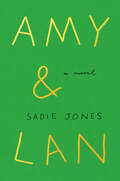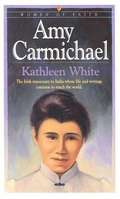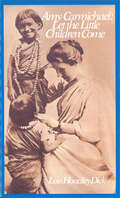- Table View
- List View
Amusing Ourselves to Death
by Neil PostmanTelevision has conditioned us to tolerate visually entertaining material measured out in spoonfuls of time to the detriment of rational public discourse and reasoned public affairs. In this elloquent persuasive book, Neil Postman alerts us to the real and present dangers of this state of affairs, and offers compeling suggestions as to how to withstand the media onslaught. Before we hand over politics, education, religion, and journalism to the show business demands of the television age, we must recognize the ways in which the media shape our lives and the ways we can in turn shape them to serve our highest goals.
Amusing Ourselves to Death: Public Discourse in the Age of Show Business (Colección Ideas/tempestad Ser. #Vol. 2)
by Neil Postman Andrew PostmanWhat happens when media and politics become forms of entertainment? As our world begins to look more and more like Orwell's 1984, Neil's Postman's essential guide to the modern media is more relevant than ever."It's unlikely that Trump has ever read Amusing Ourselves to Death, but his ascent would not have surprised Postman.” -CNNOriginally published in 1985, Neil Postman’s groundbreaking polemic about the corrosive effects of television on our politics and public discourse has been hailed as a twenty-first-century book published in the twentieth century. Now, with television joined by more sophisticated electronic media—from the Internet to cell phones to DVDs—it has taken on even greater significance. Amusing Ourselves to Death is a prophetic look at what happens when politics, journalism, education, and even religion become subject to the demands of entertainment. It is also a blueprint for regaining control of our media, so that they can serve our highest goals.“A brilliant, powerful, and important book. This is an indictment that Postman has laid down and, so far as I can see, an irrefutable one.” –Jonathan Yardley, The Washington Post Book World
Amusing the Million
by John F. KassonAmusing the Million examines the historical context in which Coney Island made its reputation as an amusement park and shows how America's changing social and economic conditions formed the basis of a new mass culture.
Amusing the Million: Coney Island at the Turn of the Century (American Century)
by John F. KassonConey Island: the name still resonates with a sense of racy Brooklyn excitement, the echo of beach-front popular entertainment before World War I. Amusing the Million examines the historical context in which Coney Island made its reputation as an amusement park and shows how America's changing social and economic conditions formed the basis of a new mass culture. Exploring it afresh in this way, John Kasson shows Coney Island no longer as the object of nostalgia but as a harbinger of modernity--and the many photographs, lithographs, engravings, and other reproductions with which he amplifies his text support this lively thesis.
Amway Forever
by Kathryn A. JonesA fascinating look at five decades of Amway's innovation Amway started in 1959 as a way for people to earn extra money selling soap and cosmetics. Today, it has recaptured the public's attention largely because of an extensive print and broadcast campaign featuring the Quixtar name-with ads saying "you know us as Amway. " Amway Forever chronicles the amazing inside story of this global business phenomenon. Page by page, it explores the history of Amway and its remarkable resurgence around the world. From how the company began and its growing pains in the 70's and 80's to its recent online revival, this book explores how Amway has survived and thrived over the past fifty years. Delves into how innovation has led to Amway's growth into an international powerhouse Reveals Amway's pioneering marketing tactics and sales strategies Offers an historic perspective, as well as a contemporary look, at how the company has evolved Engaging and informative, Amway Forever is a must-read for anyone interested in this company's unique business model and buzzworthy emergence into a global success.
Amway Japan Ltd.
by John A. Quelch David J. Arnold Yoshinori Fujikawa Patrick ReinmollerIn April 1997, the president of Amway Japan (AJL, Tokyo, Japan), pondered how to reverse the first performance decline the company has experienced since entering the Japanese direct selling market in 1979. Established as the tenth overseas subsidiary of Amway Corp. of Ada, Michigan, AJL had grown to become the most successful company with 1996 sales of Y212 billion ($1.9 billion), accounting for 30% of Amway's worldwide sales. Having succeeded in doubling AJL's sales during the five years of his presidency, the AJL president now needed to develop a strategy not only for rebuilding growth in the second half of FY 1997 but also for achieving AJL's long-term goal of sales of Y300 billion by FY 2000. AJL faced the following issues in 1997: 1) fluctuating distributor motivation, 2) growing dissatisfaction with Amway products, 3) increasing difficulty in controlling the distributor network, and 4) a changing market environment. AJL could enhance its sales growth by boosting sponsoring, retention, and/or productivity of its distributor membership. Strategic options for AJL included: 1) penetration growth, 2) productivity growth, or 3) both. The AJL president needed to come up with a clear strategic design based on a thorough analysis of the pros and cons of each strategic choice.
Amy
by Madison ColemanWhen Amy, a teenage witch, comes home to find her parents dead, she knows she must run. With her two best friends, she must do what she can to stay alive. Not knowing where they will go or what they will do, and knowing they can't live on the run forever, they must decide based on a drawing and a letter. Amy must learn her past in order to save her future.
Amy
by Peg SutherlandSISTERS A sister can be a woman's closest friend A golden wedding usually means a family celebration. But the Hardaway sisters drifted apart years ago. And each has her own reason for wanted no part of a family reunion. As plans for the party proceed, tensions mount, until it even begins to look as if their parents' marriage might fall apart before the big event. Can the daughters put aside old hurts and betrayals...for the sake of the family? Amy Hardaway has managed to persuade her older sister, Megan, to come home to Hurricane Beach to help talk some sense into their parents. Now she has to work on Lisa, the youngest Hardaway. It shouldn't be too difficult. After all, Lisa's gorgeous ex-husband, Jon, is back in town. Jon Costas has come home to help deal with his missing brother's teenage daughter. He's not interested in seeing his ex-wife again. But he's finding Amy harder and harder to resist. Could he be falling in love with another Hardaway woman? If so, his timing couldn't be worse!
Amy & Isabelle (Vintage Contemporaries Ser.)
by Elizabeth StroutFrom the Man Booker Prize longlisted author of My Name is Lucy Barton ? Isabelle Goodrow has been living in self-imposed exile with her daughter Amy for fifteen years. Shamed by her past and her affair with Amy's father, she has submerged herself in the routine of her dead-end job and her unrequited love for her boss. But when Amy, frustrated by her quiet and unemotional mother, embarks on an illicit affair with her maths teacher, the disgrace intensifies the shame Isabelle feels about her own past. Throughout one long, sweltering summer, as the events of the small town ebb and flow around them, Amy and Isabelle exist in silent conflict until a final act leads ultimately to the understanding they both crave.
Amy & Lan: A Novel
by Sadie JonesThe author of the highly acclaimed, bestselling novel The Uninvited Guests returns with a captivating coming of age story told by Amy and Lan, two children whose journey from innocence to moving experience is shaped by their families' attempt at the pastoral dream on a farm, deep in the English countryside.“The very first thing I remember is standing on the water-butt in the garden, with my Mum holding me to stop me falling, singing 'I'm On Top of the World' , and the smell of the new wood in the hot sun. And something do with Mum's silver necklace. Amy doesn't remember any of that. Her very first memory is our wolfhound Ivan knocking her over in a puddle. Or it might be eating a boiled egg, and looking at the daisies on her kitchen tablecloth.”Amy Connell and Lan Honey are having the best childhood ever. They live on a 78-acre farm in the South West of England, with sisters and brothers, other kids, chickens, goats, three dogs, and even a calf, called Gabriella Christmas. “Honeys in the Farmhouse, Connells in the Cowhouse, Hodges in the Carthouse . . .”The three sets of parents are best friends who came to Frith from the city, and are learning, year after year, how to farm the land.Free and unsupervised, Amy and Lan play with axes and climb on haystacks, but there is grownup danger at Frith they don't see. It's Gail, Lan's mother, and Adam, Amy's father who should be more careful. They should learn what kids know: never to play with fire.
Amy & Roger's Epic Detour
by Morgan MatsonThere were three things Amy Curry didn&’t expect out of senior year. First: her father&’s death. Second: her mother&’s decision to relocate to the East Coast. Third: Roger Sullivan. After her father&’s sudden death, Amy&’s mom has decided to start anew—in Connecticut, just before the start of senior year. And she&’s decided that it&’ll be Amy&’s job to get the car from California to Connecticut. The only problem? Amy hasn&’t gotten behind the wheel since the car accident that took her father&’s life. Enter Roger, a family friend, tasked by his mother to help Amy drive across the country. Amy&’s not pleased to be driving across the country with a boy she barely knows, but as Amy gets lost on her cross-country adventure, she must confront the past she&’s running from, come to terms with the grief of losing a parent, and learn how to open her heart in order to find herself again.
Amy & Roger's Epic Detour: Amy And Roger's Epic Detour; Second Chance Summer; Since You've Been Gone
by Morgan MatsonFrom a talented debut author, the moving and relatable story of a girl who takes a road trip to find herself--and the guy who goes with her.
Amy Among the Serial Killers: A Novel (Amy Gallup #3)
by Jincy WillettJincy Willett's beloved characters return in Amy Among the Serial Killers, a wickedly smart and funny take on the thriller genre by one of our most acclaimed literary humorists.Carla Karolak is doing just fine. Having escaped the clutches of her controlling mother and founded a successful writing retreat in which participants are confined to windowless cells until they hit their daily word count, she lives a comfortable, if solitary, existence. If only her therapist, Toonie, would stop going on about Carla's nonexistent love life and start addressing her writer’s block, she might be able to make some progress. But then Carla finds Toonie murdered, and suddenly her unfinished memoir is the least of her concerns. Without quite knowing why, she dials an old phone number.Amy Gallup, retired after decades as a writing instructor, is surprised to hear from her former student Carla out of the blue, three years since they last spoke. She’s even more shocked when she finds out the reason for Carla's call. Suddenly, she finds herself swept up in a murder investigation that soon brings her old writing group back together. But they’ll need all the help they can get, as one murder leads to another, and suspicions of a serial killer mount across San Diego.Full of Jincy Willett’s trademark dark humor, an unforgettable cast of characters, and two of the most endearingly imperfect protagonists who have ever attempted to solve a murder, Amy Among the Serial Killers shows us what can be gained when we begin to break down our own walls and let others inside…as long as they aren’t murderers.
Amy Butler's Blossom
by Amy ButlerAmy Butler's Blossom magazine is a biannual collection of everything that inspires her: page after page of photographs from her travels to spiritual locales such as Morocco and Sedona; meditative articles from like-minded designers, artists, and life coaches; the signature designs and textiles that she creates from these inspirations; plus her ongoing exploration of positive and joyful living. Now available in print for the first time, this irresistible look-book compiles the first two issues of the magazine. Brimming with photographs, fashion, art, patterns, and written pieces that reflect Amy's unique philosophy of life and style, Blossom will capture the imagination of anyone in search of beauty and meaning.
Amy Butler's Blossom: Create Love - Express Beauty - Be Kind
by Amy ButlerAmy Butler's Blossom magazine is a biannual collection of everything that inspires her: page after page of photographs from her travels to spiritual locales such as Morocco and Sedona; meditative articles from like-minded designers, artists, and life coaches; the signature designs and textiles that she creates from these inspirations; plus her ongoing exploration of positive and joyful living. Now available in print for the first time, this irresistible look-book compiles the first two issues of the magazine. Brimming with photographs, fashion, art, patterns, and written pieces that reflect Amy's unique philosophy of life and style, Blossom will capture the imagination of anyone in search of beauty and meaning.
Amy Butler's In Stitches: More Than 25 Simple and Stylish Sewing Projects
by Colin Mcguire Amy ButlerCelebrated designer Amy Butler brings her fresh, modern style to the timeless craft of sewing. In this lavishly illustrated collection of patterns, she presents more than 25 charming projects ranging from cushy floor cushions to smart aprons to stylish handbags. Lush photographs inspire, while how-to illustrations and straightforward text (minus the confusing sewing lingo) make it a cinch to achieve beautifully finished projects. In addition, Amy offers thoughtful tips on finding and treating new or vintage fabrics, an easy-to-navigate techniques section, and a glossary and resource guide at back. Whether it's chic placemats and napkins for the kitchen, a luxurious kimono-style robe for the bath, or handy organizer baskets for the home office Amy Butler's In Stitches makes it easy to create beautiful accessories for every room and every mood.
Amy Butler's Little Stitches for Little Ones: 20 Keepsake Sewing Projects for Baby and Mom
by Amy ButlerIn this illustrated collection, the fabric designer shares twenty charming, contemporary projects for the nursery and beyond. Amy Butler’s Little Stitches for Little Ones features twenty handmade treasures that are destined to become cherished hand-me-downs for generations to come. There’s a snuggly wrap blanket, imaginative plush toys, bright diaper bags, handy travel bibs, and much more. Beautiful photos inspire, while illustrations and simple instructions explain the techniques. Amy also shares tips on choosing baby-friendly fabrics and includes a comprehensive techniques section, glossary, and resource guide. With her eye for detail and her signature fine craftsmanship, Amy has created a delightful selection of handcrafted keepsakes.
Amy Butler's Piece Keeping: 20 Stylish Projects that Celebrate Patchwork
by Amy ButlerIn this project-based sewing book, Amy Butler teaches what she does best: sewing, quilting, and pattern making. From lampshades to pillows, quilts to statement jewelry, Piece Keeping is the perfect go-to for the crafty. With clear sections on traditional sewing themes, tools, and methods, this book will appeal to Amy's core fans as well as those simply drawn to beautiful fabrics and DIY projects. The 20 inspiring projects include dozens of how-to diagrams, plus 9 downloadable patterns. Piece Keeping is both a practical guide and a source for stylish home décor and fashion inspiration, brimming throughout with Amy's unique color sense and eye-catching textile designs.
Amy Butler's Style Stitches: 12 Easy Ways to 26 Wonderful Bags
by Amy ButlerIn this illustrated sewing guide, the celebrated designer shares twelve new patterns with loads of variations for stylish bags of all kinds.With the patterns in Amy Butler’s Style Stitches, you can create everything from chic clutches and delicate wristlets to pretty hobo bags and handy coin purses. Each project is designed with Butler’s fresh, modern style and attention to detail. She also includes easy-to-follow instructions for altering dimensions, straps, and embellishments so you can make each piece truly your own.This ebook includes illustrated step-by-step directions, a comprehensive techniques section, and instructions for how to print the patterns themselves, making an essential and fashionable addition to every sewer’s digital library.
Amy Carmichael (Women of Faith Series)
by Mary E. BaldwinBiography of the famous missionary to India whose main mission was to rescue children used in Temple worship and bring them to a knowledge of Jesus Christ.
Amy Carmichael: Let the Little Children Come
by Lois Hoadley DickArriving in India, Amy Carmichael sees little children married to pagan priests for temple prostitution. Amy rescues these children and provides a safe, healthy home for them.
Amy Carmichael: Let the Little Children Come
by Lois Hoadley DickArriving in India, Amy Carmichael sees little children married to pagan priests for temple prostitution. Amy rescues these children and provides a safe, healthy home for them.
Amy Chelsea Stacie Dee
by Mary G. ThompsonA bittersweet homecoming holds dark secrets in this heart-wrenching story of loss, love, and survival for readers of Room When sixteen-year-old Amy returns home, she can't tell her family what's happened to her. She can't tell them where she's been since she and her best friend, her cousin Dee, were kidnapped six years ago--who stole them from their families or what's become of Dee. She has to stay silent because she's afraid of what might happen next, and she's desperate to protect her secrets at any cost. Amy tries to readjust to life at "home," but nothing she does feels right. She's a stranger in her own family, and the guilt that she's the one who returned is insurmountable. Amy soon realizes that keeping secrets won't change what's happened, and they may end up hurting those she loves the most. She has to go back in order to move forward, risking everything along the way. Amy Chelsea Stacie Dee is a riveting, affecting story of loss and hope.
Amy Elizabeth Explores Bloomingdale's
by E. L. KonigsburgThe many sights of New York provide daily distractions for Amy Elizabeth and Grandma as they attempt to find the time to go see Bloomingdale's.
